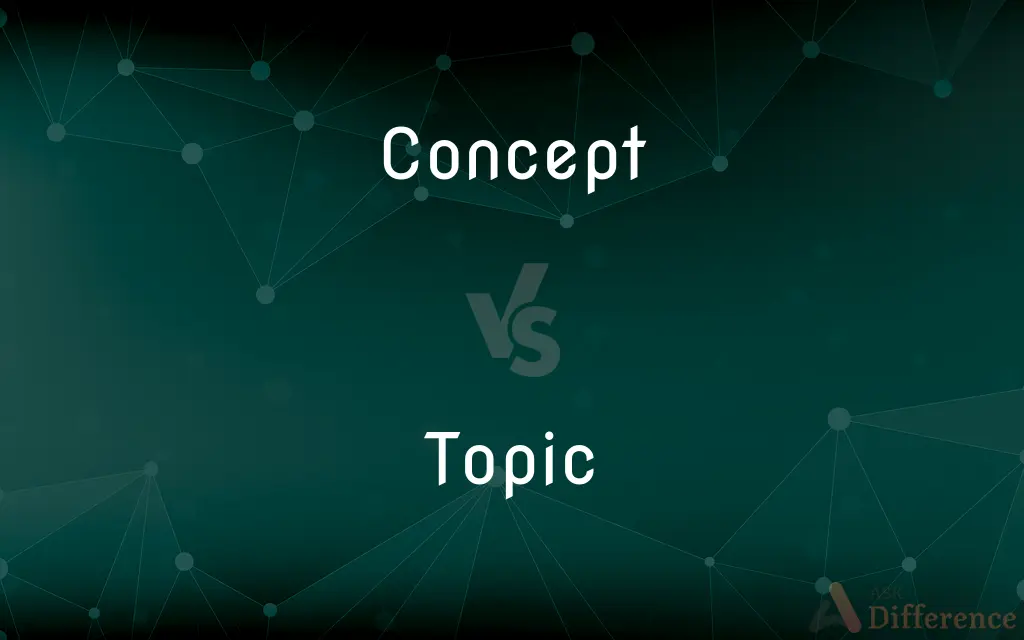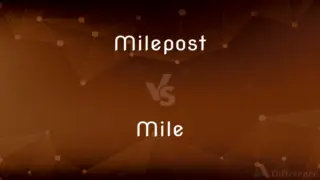Concept vs. Topic — What's the Difference?
By Urooj Arif & Fiza Rafique — Updated on March 22, 2024
A concept is a general idea or understanding, while a topic refers to the subject or theme of a discussion or document, focusing more on specificity.

Difference Between Concept and Topic
Table of Contents
ADVERTISEMENT
Key Differences
Concepts represent abstract ideas or principles that help us understand phenomena. They are broad and can apply across different contexts, serving as building blocks for knowledge. On the other hand, a topic is more specific and denotes the subject matter of a conversation, study, or document. It is the particular focus within a broader area of interest.
While concepts are foundational to various fields of study, allowing for the development of theories and models, topics are the subjects that are explored within these fields. Topics can be considered as instances or applications of concepts, providing a practical context in which concepts can be examined and understood.
Concepts often require a level of abstraction and generalization, making them applicable in multiple scenarios. For instance, the concept of 'justice' can be applied in legal, social, and personal contexts. Conversely, a topic like 'the impact of social media on privacy' is a specific area of inquiry within the broader fields of technology, psychology, and ethics.
In education, concepts are taught to develop a student's critical thinking and understanding of fundamental principles, whereas topics are selected to apply these concepts practically, enhancing comprehension through specific examples and case studies.
Concepts are timeless and universal, not tied to any particular period or culture, such as 'democracy' or 'entropy'. Topics, however, are often temporal or situational, like 'the effects of climate change on polar bears' or 'the role of artificial intelligence in healthcare', reflecting current concerns and interests.
ADVERTISEMENT
Comparison Chart
Definition
A general idea or principle that forms the basis of understanding and reasoning.
A specific subject or area of interest that is the focus of discussion, study, or writing.
Scope
Broad and abstract, applicable across different contexts.
Narrow and specific, pertaining to a particular focus within a broader area.
Application
Serves as foundational knowledge across disciplines.
Centers on specific instances or issues for exploration or discussion.
Temporality
Timeless and universal, not tied to any particular time or culture.
Often tied to contemporary issues, reflecting current concerns and interests.
Educational Role
Taught to develop critical thinking and understanding of fundamental principles.
Selected to apply concepts practically through specific examples and case studies.
Compare with Definitions
Concept
A mental representation of an idea.
The concept of gravity explains why objects fall towards the Earth.
Topic
A theme for discussion or exploration.
Our next meeting will cover the topic of renewable energy sources.
Concept
A foundational belief or philosophy.
The concept of non-violence is central to many peace movements.
Topic
The subject of a text. conversation. or study.
The topic of today's lecture is the French Revolution.
Concept
A category used to group similar items or phenomena.
The concept of species helps biologists classify living organisms.
Topic
An area selected for investigation or writing.
She chose climate change as her research paper topic.
Concept
An innovative idea or approach.
The architect's new concept for the building included eco-friendly materials.
Topic
The focus of a debate or argument.
The debate team prepared arguments on the topic of internet privacy.
Concept
An abstract principle guiding thought or action.
The concept of justice influences many legal systems around the world.
Topic
A particular issue or area of interest.
Finding a cure for cancer is a challenging topic for researchers.
Concept
Concepts are defined as abstract ideas or general notions that occur in the mind, in speech, or in thought. They are understood to be the fundamental building blocks of thoughts and beliefs.
Topic
The subject of a speech, essay, thesis, or discourse.
Concept
An abstract idea
Structuralism is a difficult concept
The concept of justice
Topic
A subject of discussion or conversation.
Concept
A general idea or understanding of something
The concept of inertia.
The concept of free will.
Topic
A subdivision of a theme, thesis, or outline.
Concept
A plan or original idea
The original concept was for a building with 12 floors.
Topic
(Linguistics) A word or phrase in a sentence, usually providing information from previous discourse or shared knowledge, that the rest of the sentence elaborates or comments on. Also called theme.
Concept
A unifying idea or theme, especially for a product or service
A new restaurant concept.
Topic
Topical
Concept
Having an experimental or strikingly different design, especially to test or demonstrate new features
A concept car.
Topic
Subject; theme; a category or general area of interest.
A society where a topic cannot be discussed, does not have free speech.
Stick to the topic
An interesting topic of conversation
Romance is a topic that frequently comes up in conversation
Concept
An abstract and general idea; an abstraction.
Topic
(Internet) Discussion thread.
Concept
Understanding retained in the mind, from experience, reasoning and imagination; a generalization (generic, basic form), or abstraction (mental impression), of a particular set of instances or occurrences (specific, though different, recorded manifestations of the concept).
Topic
(music) A musical sign intended to suggest a particular style or genre.
Concept
(generic programming) A description of supported operations on a type, including their syntax and semantics.
Topic
(obsolete) An argument or reason.
Concept
To conceive; to dream up
Topic
An external local application or remedy, such as a plaster, a blister, etc.
Concept
An abstract general conception; a notion; a universal.
The words conception, concept, notion, should be limited to the thought of what can not be represented in the imagination; as, the thought suggested by a general term.
Topic
One of the various general forms of argument employed in probable as distinguished from demonstrative reasoning, - denominated by Aristotle to`poi (literally, places), as being the places or sources from which arguments may be derived, or to which they may be referred; also, a prepared form of argument, applicable to a great variety of cases, with a supply of which the ancient rhetoricians and orators provided themselves; a commonplace of argument or oratory.
These topics, or loci, were no other than general ideas applicable to a great many different subjects, which the orator was directed to consult.
In this question by [reason] I do not mean a distinct topic, but a transcendent that runs through all topics.
Concept
An abstract or general idea inferred or derived from specific instances
Topic
An argument or reason.
Contumacious persons, who are not to be fixed by any principles, whom no topics can work upon.
Topic
The subject of any distinct portion of a discourse, or argument, or literary composition; also, the general or main subject of the whole; a matter treated of; a subject, as of conversation or of thought; a matter; a point; a head.
Topic
An external local application or remedy, as a plaster, a blister, etc.
Topic
Topical.
Topic
The subject matter of a conversation or discussion;
He didn't want to discuss that subject
It was a very sensitive topic
His letters were always on the theme of love
Topic
Some situation or event that is thought about;
He kept drifting off the topic
He had been thinking about the subject for several years
It is a matter for the police
Common Curiosities
What defines a topic?
A topic is a specific subject or area of interest that is the focus of discussion, study, or writing.
Are concepts only relevant in academic settings?
No, concepts are applicable in everyday life, guiding understanding and behavior.
How do concepts and topics differ in scope?
Concepts are broad and abstract, while topics are more specific and focused.
Is it easier to understand a concept through topics?
Topics provide practical examples that can make it easier to understand abstract concepts.
What is a concept?
A concept is a general idea or understanding that forms the basis of reasoning and knowledge.
Can a concept exist without topics?
Concepts can exist independently as abstract ideas, but topics provide contexts for their application and exploration.
Can a topic become a concept?
A topic might evolve into a concept if it leads to the development of a general principle or theory.
Do concepts change over time?
While the core idea of a concept may remain stable, its application and understanding can evolve.
Can the same topic fall under different concepts?
Yes, a topic can be explored from the perspective of multiple concepts, such as economic, social, and ethical aspects.
How do topics relate to current events?
Topics often reflect current concerns and interests, making them relevant to contemporary issues.
Why are concepts important in education?
Concepts help develop critical thinking and a deep understanding of fundamental principles across disciplines.
What role do topics play in research?
Topics guide the direction of research, focusing efforts on specific questions or problems.
How do concepts and topics interact in learning?
Learning often involves understanding concepts through the lens of specific topics, integrating abstract and practical knowledge.
How are topics chosen for study or discussion?
Topics are usually selected based on interest, relevance, and the potential for new insights or solutions.
Can one topic cover multiple concepts?
Yes, a single topic can encompass multiple concepts, offering a multidisciplinary approach to its exploration.
Share Your Discovery

Previous Comparison
God vs. Gad
Next Comparison
Milepost vs. MileAuthor Spotlight
Written by
Urooj ArifUrooj is a skilled content writer at Ask Difference, known for her exceptional ability to simplify complex topics into engaging and informative content. With a passion for research and a flair for clear, concise writing, she consistently delivers articles that resonate with our diverse audience.
Co-written by
Fiza RafiqueFiza Rafique is a skilled content writer at AskDifference.com, where she meticulously refines and enhances written pieces. Drawing from her vast editorial expertise, Fiza ensures clarity, accuracy, and precision in every article. Passionate about language, she continually seeks to elevate the quality of content for readers worldwide.















































